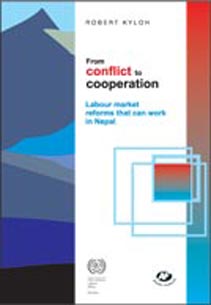 A4
A4

Paperback
•
2008
Pages: 218
ISBN: 9788171886876
INR 495

This book reviews the history of labour relations in Nepal and considers criticisms of the existing industrial relations system. It reports on the re-emergence of the militant Maoist trade union and the recent upsurge in strikes and demonstrations in Nepal. A reduction in workplace tension is needed to cement in place the recent peace agreement, facilitate political stability and promote economic growth.
Focusing on broad economic developments since 1990, it sheds light on how labour legislation and labour institutions have influenced investment, growth and jobs over the long term. The views of those most directly affected by the labour legislation, institutions and attitudes that govern industrial relations in Nepal have been collected through surveys and interviews with managing directors and entrepreneurs, trade union leaders and hundreds of ordinary workers from a range of locations, industries and occupations. These views have heavily influenced the conclusions presented in this volume.
The International Labour Organization :
The International Labour Organization was founded in 1919 to promote social justice and, thereby, to contribute to universal and lasting peace. Its tripartite structure is unique among agencies affiliated to the United Nations; the ILO's Governing Body includes representatives of governments, and of employers' and workers' organizations. These three constituencies are active participants in regional and other meetings sponsored by the ILO, as well as in the International Labour Conference a world forum that meets annually to discuss social and labour questions.
Over the years the ILO has issued for adoption by member States a widely respected code of international labour Conventions and Recommendations on freedom of association, employment, social policy, conditions of work, social security, industrial relations and labour administration, and child labour, among others.
The ILO provides expert advice and technical assistance to member States through a network of offices and multidisciplinary teams in over 40 countries. This assistance takes the form of labour rights and industrial relations counselling, employment promotion, training in small business development, project management, advice on social security, workplace safety and working conditions, the compiling and dissemination of labour statistics, and workers' education.
Robert Kyloh